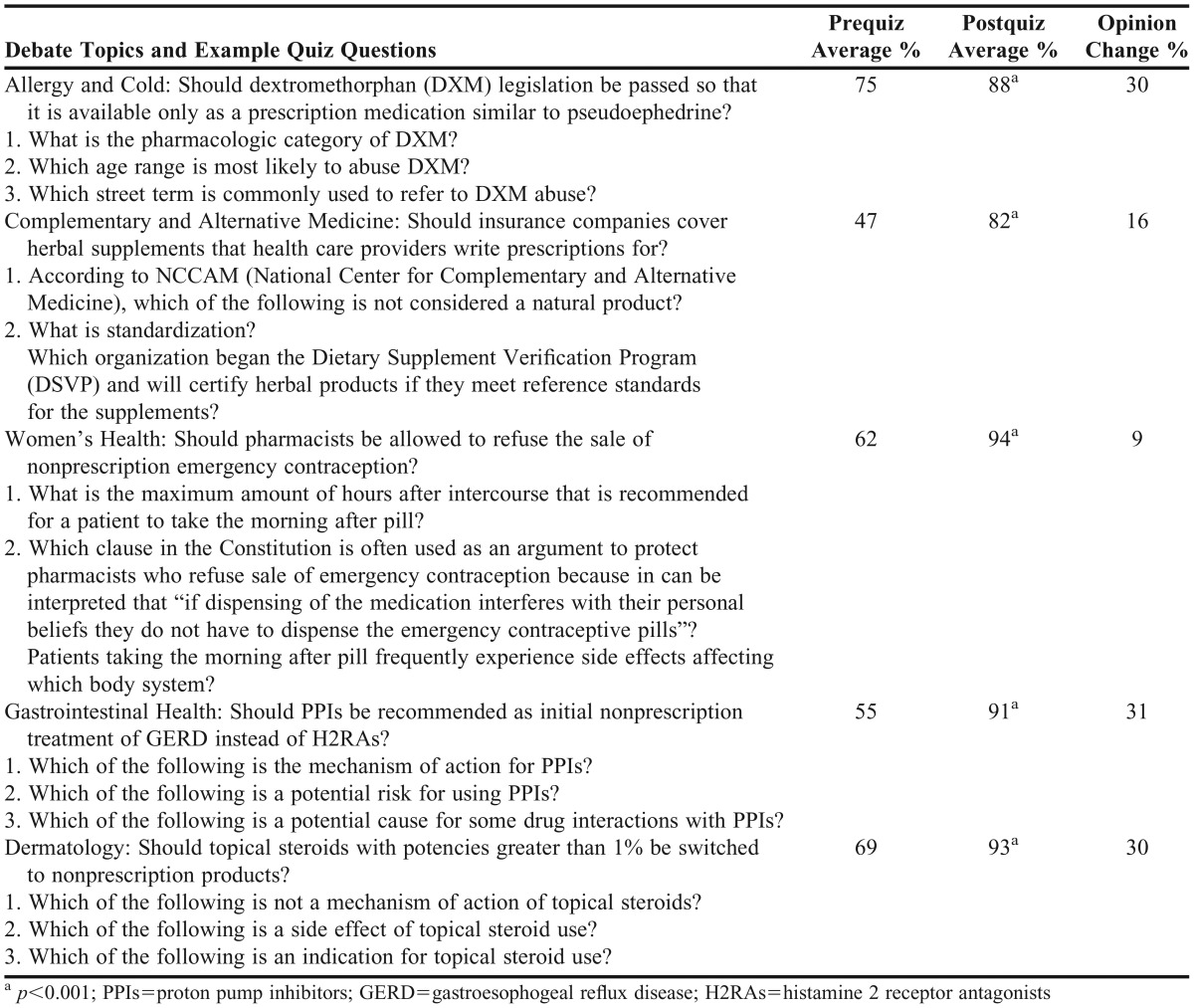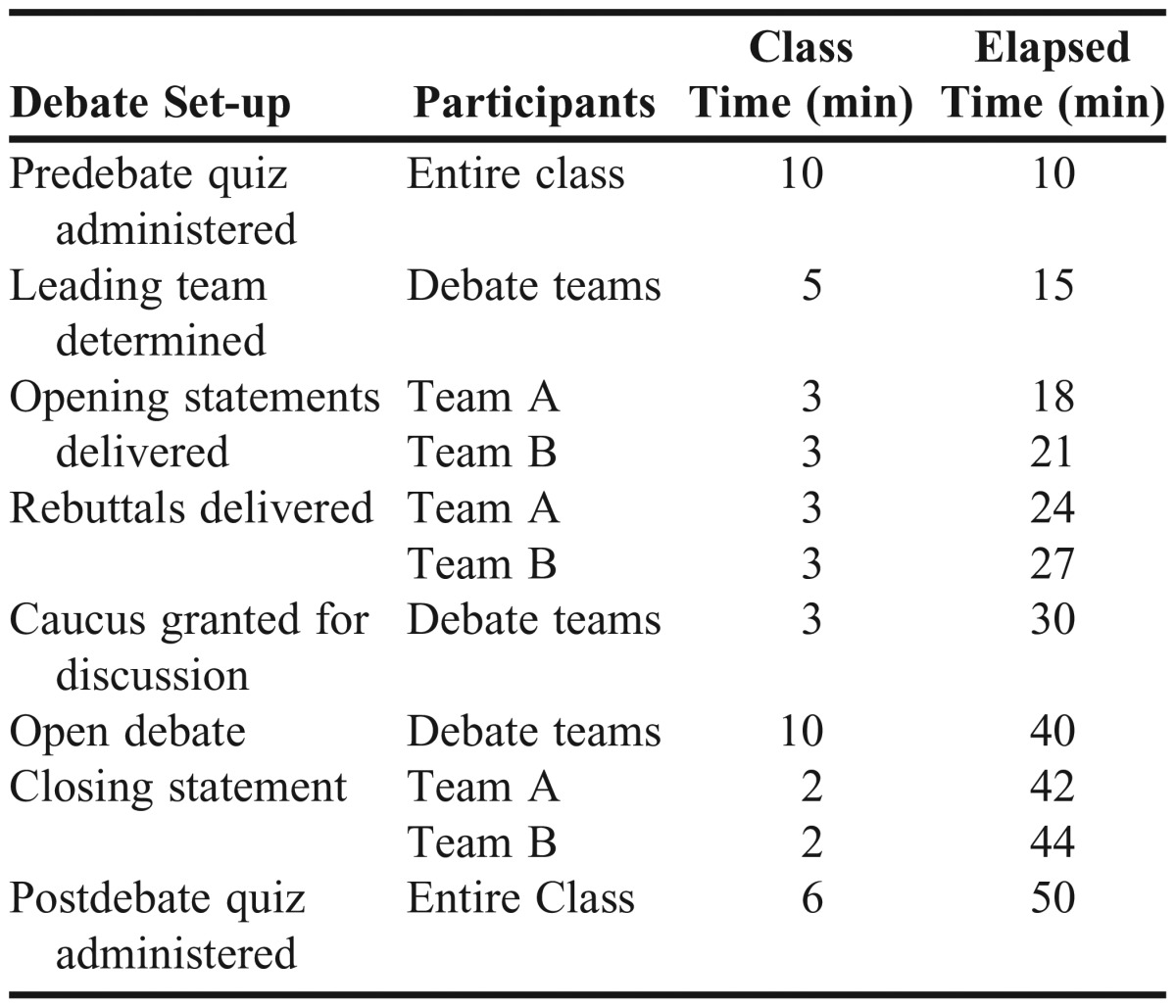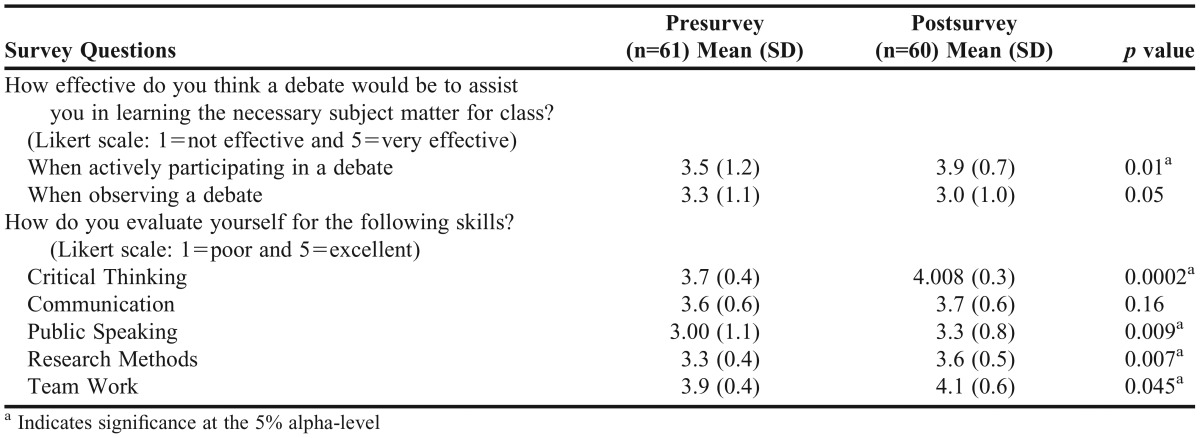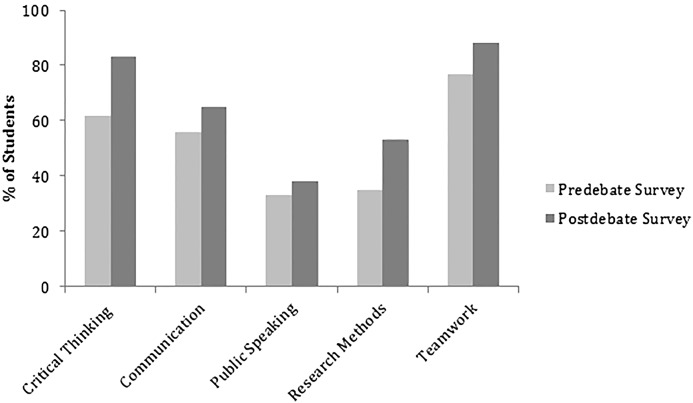Abstract
Objective. To evaluate the usefulness of formal debates in the pharmacy classroom as a way to learn course material and as a tool for developing competency in essential skills including critical thinking, communication, public speaking, research methods, and teamwork.
Design. Debates were incorporated into a self-care course, where students were assigned different debate topics focused on controversial issues. Quantitative analysis was completed to assess debate style learning, knowledge about the subjects presented, and the impact on necessary skills.
Assessment. Quizzes given before and after debates showed up to a 36% improvement in grades and up to a 31% change in opinions on the topic. Students assessed themselves as more competent in the skill sets at the completion of the debate series.
Conclusion. Incorporation of debates into didactic style courses offers students an opportunity to improve upon skills that will help them succeed as pharmacists.
Keywords: pharmacy, self-care, debate, active learning, instructional design
INTRODUCTION
Pharmacy is transitioning from a product-focused to a patient-focused profession.1 This is reflected in American College of Clinical Pharmacy’s (ACCP) vision statement for the profession of pharmacy, which states, “As health care providers responsible for quality patient care, pharmacists will be accountable for optimal medication therapy in the prevention and treatment of disease.”2 The role of the pharmacy in health care continues to evolve, and pharmacists encounter an increasing number of controversial issues, such as the pharmacist’s ethical and legal right to decline a patient medication and conversions of prescription medications to nonprescription or prescription status. Developing the skills to manage such issues helps expand the role of the pharmacist, while upholding the corresponding moral requirements of a health care professional.
According to the ACCP white paper “Clinical Pharmacist Competencies,” skills pharmacists need to be proficient in include clinical problem-solving, judgment, decision-making, communication, medical information evaluation, and therapeutic knowledge.3 These skills are crucial to practice evidence-based medicine (EBM).4 Repetition is necessary for mastery of skills, therefore students should start developing them early in the pharmacy curriculum.3,5 These skills are also covered in the Center for the Advancement of Pharmacy Education (CAPE) Educational Outcomes that define knowledge, skills, and attitudes pharmacy students should possess upon graduation from a doctor of pharmacy (PharmD) program.5 Innovation is needed in pharmacy education so students can achieve CAPE outcomes such as problem solving: identify problems, explore and prioritize potential strategies, and design, implement, and evaluate a viable solution; educator: educate all audiences by determining the most effective and enduring ways to impart information and assess understanding; interprofessional collaboration: actively participate and engage as a health care team member by demonstrating mutual respect, understanding, and values to meet patient care needs; and communication: effectively communicate verbally and nonverbally when interacting with an individual, group, or organization.5 Integrating debate into the classroom early in the pharmacy curriculum is one innovative method to promote the development of these skills. A formal debate series could assess students’ perceptions of debates and its impact on critical-thinking, communication, public-speaking, research methods, and teamwork skills.
DESIGN
The self-care course was a required 3-credit hour course offered in the spring semester of the first professional pharmacy year. It met twice per week for 50 minutes and 110 minutes, respectively. It was a primarily didactic-based course to introduce students to various self-care topics. In order to provide the students the evaluation level of learning as described by Bloom’s Taxonomy,6 a debate series was incorporated into the course the spring 2012 semester. The purpose of the debate was to provide students with an active-learning opportunity and faculty feedback on debate assignments that would help them enhance their critical-thinking, oral and written communication, public-speaking, research methods, and teamwork skills.
The series consisted of 5 debates, each of which focused on a controversial self-care related topic. During the first class, a 30-minute overview session covered the purpose of the debates, preparation and classes structure, and a mock debate. Also during the overview, students completed a precourse survey, and information was disseminated regarding debate guidelines, team assignments, and the general topics. The guidelines consisted of the rationale of including debates in the class, structure and expectations, an overview of how debate class sessions would function, written report requirements, and information on grading with rubrics. The general debate topics were in the areas of allergy and cold, complementary and alternative medicine, women’s health, gastrointestinal health, and dermatology. The topics were chosen because they corresponded with a didactic lecture already being taught in the course. The 62 students taking the course were assigned to 10 different teams. Each debate team, composed of 6 or 7 students, was assigned to 1 of the 5 debate topics on either the pro or the con side. Each team was provided a specific debate question (Table 1) 3 weeks prior to their assigned debate day. All debates occurred before the lecture on the same topic so students would research information prior to learning about the topic during the lecture.
Table 1.
Overview of Debate Topics, Example Quiz Questions, Quiz Grades, and Opinion Changes

Teams were required to complete a professional and evidence-based written report about their side of the topic prior to the day of debate. Each team member participated in at least one of the following: opening argument, rebuttal, the formal debate, or closing remarks during the forum. After the debate was completed, each team member completed team and self-evaluation rubrics. The students not actively participating in the debate were considered observers and were required to provide observational feedback using a peer-evaluation rubric. On debate days, all students in the class were required to take a predebate and postdebate quiz. An overview of the debate day can be found in Table 2.
Table 2.
Overview of Debate Day Classroom Activities

Two qualitative assessments were used to determine the success of the debate series, predebate and postdebate quizzes, and precourse and postcourse surveys. The quizzes were used to assess students’ understanding of the material before and after a debate and to determine if their personal viewpoint on the debate topic had changed. The quizzes were identical and composed of multiple-choice questions. The faculty member created the quizzes after reviewing students’ written report to ensure the content would be discussed during the debate. As the quizzes were dependent on the students’ material, the majority of questions were knowledge-based.6 Examples of quiz questions from each debate can be found in Table 1.
Students completed matching precourse and postcourse surveys to self-assess perceptions of learning subject material and developing critical-thinking, oral and written communication, public-speaking, research methods, and teamwork skills during the debate series. The precourse survey was administered prior to the introduction of the debate assignment. The postcourse survey assessed changes in student views of debates and identified possible perceived improvements in the targeted skill sets.
The D’Youville College Institutional Review Board approved the study course design and the surveys given at the beginning and end of the course. Predebate and postdebate quizzes as well as precourse and postcourse surveys were analyzed using descriptive statistics. The quiz grades and Likert-scale means from the course surveys were also analyzed using a 2 sample-paired t test.7 A p value of <0.05 was deemed significant. The Analysis Toolpak add-in to Microsoft Excel 2010 was used to conduct the statistical analysis.
EVALUATION AND ASSESSMENT
The average grade on postdebate quizzes showed a significant improvement compared to predebate quizzes on all 5 debate days, with increases ranging from 13% to 36%. From 9% to 31% of students changed their opinion about topics following the debate forum (Table 1).
The analysis of the self-assessments showed most students acknowledged that participating in a debate assisted them in learning material, but that observing the debates did not. According to the precourse surveys, 52% of students stated actively participating in the debate would assist them in learning subject matter, this number increased to 71% on the postcourse survey. Forty-one percent of students reported on the precourse survey that debate observation would not be useful in learning subject matter, and 31 percent reported this on the postcourse survey. This result was consistent with mean comparisons of student perceptions of debate effectiveness on learning (Table 3). Ninety-two percent of students responded that preparing for the debate was at least slightly effective in helping them improve the key skills evaluated. When comparing the mean skill ratings, a significant self-reported student change occurred for critical thinking, public speaking, research methods, and teamwork (Table 3). On average, students evaluated themselves as more competent in all assessed areas after participating in the course (Figure 1).
Table 3.
Predebate and Postdebate Survey Questions and Analysis

Figure 1.
Students who Self-Evaluated their Skills as Better than Average
After observing each debate, 2 faculty members discussed and evaluated students’ performance and the observing students’ participation. They were impressed by the effort and enthusiasm students put forth when debating. The faculty members found that many students observing the debates had an opinion and wanted to be involved in the debate process. Additionally, the debate discussion often continued after class. The weakest debate was on gastrointestinal health as this topic was more clinical compared to other topics. The most difficult part for faculty members was the initial preparation time, which required approximately 30 hours of the course coordinator’s time to create all required materials to successfully integrate the debate series into the course. Moreover, the syllabus needed to be reworked to find 5 hours of inclass time for the debate days. Adding debates did not, however, increase faculty contact time with students because a faculty member would have lectured more extensively on the topic if a debate had not been incorporated.
Various factors were considered when determining the grading scheme. First, we wanted to ensure that students would openly debate the topics without fear of faculty criticism. Therefore, 80% of the overall faculty-given debate grade was from the written report and the remaining 20% was based on the team’s debate day preparedness and professionalism. Next, in an effort to encourage participation from all debate team members during the entire preparation process, each team member was required to complete self-evaluation and team-evaluation rubrics. Lastly, students who were observing used peer evaluation rubrics to evaluate the debating team’s professionalism, preparedness, and argument reliability and validity.
DISCUSSION
This study is unique because it is the first to describe the effects of a debate series on student learning and skill development in a didactic pharmacy course. From student and faculty standpoints, the debate series was an effective active-learning strategy. This finding is similar to that of other studies, which have shown students in professional programs favored the use of debates in courses.8-10
Based on the precourse and postcourse surveys, the overall student perception of the effect of debates on learning subject material varied depending on whether students were participating in or observing the debate. Most students reported that participating in a debate assisted them in learning material, while observing the debates did not. These results reinforced the faculty member’s notion that students would learn from the debate preparation and participation process. Students debated the topics prior to learning about them in the class, which forced them to research background information, review the literature, and utilize the skills necessary to be an independent self-directed learner.
Debate quiz grades improved after the debate, even among observing students, which suggested that observation of debates did increase student knowledge despite students’ reported perception that it did not. This discrepancy could be a result of using the same predebate and postdebate quiz to assess for improvement of knowledge. It is possible students’ grades improved because they knew the postdebate questions and not because they learned from direct observation of the debates.
This study was also able to quantify improvement in students’ self-assessment of critical-thinking, communication, public-speaking, research methods and teamwork skills after the debate series. This result is consistent with other studies in professional programs that have shown debates cultivate skills such as communication, decision-making, and problem-solving.8-12 However, students could have developed improvement in these skills outside the debate series. While the influence of other courses on skill development was inevitable, students were able to demonstrate certain skills during debate days. For example, in addition to students rating themselves improved in critical thinking, this improvement was demonstrated through students changing their opinions on debated topics. The process of changing an opinion requires a student to make a conclusion based on evaluation of evidence presented during the debate, thus demonstrating critical thinking.
Pharmacy curricula should strive to give students opportunities to practice skills in order to meet predefined educational outcomes and AACP competencies.3,5 This debate series demonstrated that it could play a role in the overall improvement of skills; thus, it will continue to be a component of the self-care course. A debate series is an active-learning method that could be implemented in other courses, but it may be difficult to find time to incorporate debate days without reducing didactic learning time. The number of debates would be dependent on the number of students in the classroom—we found 14 students per debate allowed for an effective team of 7 students per side. We conducted 5 debates but, if the number of students in the classroom grew, we would add in an additional debate.
Creation and implementation of the debate series was time consuming, but it positively influenced knowledge and skill development for all students taking the course, since all students were required to actively participate in a debate. Once the debate series was implemented, the most difficult aspect of maintaining it was creating new topics. Debate topics could be reused each year, but we chose not to repeat topics to reduce the risk of students using a previous team’s work. Also, as self-care evolves and changes, a debate topic may not remain relevant to current issues. Other faculty members in this team taught course were consulted to help create relevant topics, which helped the course coordinator and the faculty member teaching the didactic portion, as the debate topic could be used to stimulate discussion in the classroom. Another challenge included creating quizzes based on the written reports, which were due the morning of the debate. Thus, it was only known then exactly what content each debate and, in turn, each quiz would consist of. One possible solution would be to have each student on the debate team submit a question with the written report.
We learned 2 important lessons during implementation of the debate series. The first was to ensure the class stayed on track during the debate day and the second was to provide as much detail as possible about the expectations and requirements associated with the debate. Each debate required the full 50-minutes of class time to complete all parts of the process. Occasionally, there was time for discussion and clarification of the debate topic, but more often this had to be postponed to the following class session. Furthermore, the guidelines were ultimately comprehensive enough for all aspects of the debate except for the written report requirement, which we discovered when written reports completed for the first debate were below expectations. As a result, we created a written report template to provide a detailed explanation of each section to be included in the report.
As the debate series continues in the self-care course, we will continue to evaluate its effectiveness as an active-learning strategy to enhance student pharmacist skills. We also plan to correlate quiz grades with perceptions of debates. This may help to determine if there is an association between learning the topic material and students who are more involved and enjoy participating and observing debates.
SUMMARY
Active participation is crucial in students’ perception of their ability to retain and comprehend information. Most students stated participating in the active-learning debate series was at least slightly effective in improving crucial skills such as critical-thinking, communication, public-speaking, research methods, and teamwork. Once the debate series was implemented, it was easily maintained. Thus, the debate series was useful as an active-learning classroom tool to use in conjunction with didactic learning to improve overall education.
ACKNOWLEDGMENTS
The authors would like to acknowledge PharmD candidates Aaron Barczak, Janelle Juda, John Jiles, Jacob Northrup, Dimeji Oyetunji, and Amanda Ryan for their help on this project.
REFERENCES
- 1.Zellmer WA. Pharmacy’s future: transformation, diffusion, and imagination. Am J Health Syst Pharm. 2010;67(14):1199–204. doi: 10.2146/ajhp090539. [DOI] [PubMed] [Google Scholar]
- 2.American College of Clinical Pharmacy. The strategic plan of the American College of Clinical Pharmacy. http://www.accp.com/docs/about/ACCP_Strategic_Plan.pdf. Accessed June 5, 2014.
- 3.Burke JM, Miller WA, Spencer AP, et al. Clinical pharmacist competencies. Pharmacotherapy. 2008;28(6):806–815. doi: 10.1592/phco.28.6.806. [DOI] [PubMed] [Google Scholar]
- 4.Sackett DL SS, Richardson WS, Rosenberg W, Haynes RB. Evidence-Based Medicine: How to Practice and Teach EBM. London: Churchill Livingstone; 2000. [Google Scholar]
- 5.Medina MS, Plaza CM, Stowe CD, et al. Center for the Advancement of Pharmacy Education 2013 educational outcomes. Am J Pharm Educ. 2013;77(8):Article162. doi: 10.5688/ajpe778162. [DOI] [PMC free article] [PubMed] [Google Scholar]
- 6.Bloom VS, editor. Taxonomy of Education Objectives. The Classification of Educational Goals. Handbook I: Cognitive Domain. New York, NY: McKay; 1956. [Google Scholar]
- 7.Norman G. Likert scales, levels of measurement and the ‘‘laws’’of statistics. Adv Health Sci Educ Theory Pract. 2010;15(5):625–632. doi: 10.1007/s10459-010-9222-y. [DOI] [PubMed] [Google Scholar]
- 8.Smith Randolph D. Student perceptions of the use of debate as a teaching strategy in the allied health professions. J Allied Health. 2007;36(1):e13–29. [PubMed] [Google Scholar]
- 9.Candela L, Michael SR, Mitchell S. Ethical debates: enhancing critical thinking in nursing students. Nurse Educ. 2003;28(1):37–39. doi: 10.1097/00006223-200301000-00013. [DOI] [PubMed] [Google Scholar]
- 10.Rubin RW, Weyant RJ, Trovato CA. Utilizing debates as an instructional tool for dental students. J Dent Educ. 2008;72(3):282–287. [PubMed] [Google Scholar]
- 11.Lin SJ, Crawford SY. An online debate series for first-year pharmacy students. Am J Pharm Educ. 2007;71(1):Article 12. doi: 10.5688/aj710112. [DOI] [PMC free article] [PubMed] [Google Scholar]
- 12.Green CS, Klug HG. Teaching critical thinking and writing through debates: an experimental evaluation. Teach Sociol. 1990;18(4):462–471. [Google Scholar]



